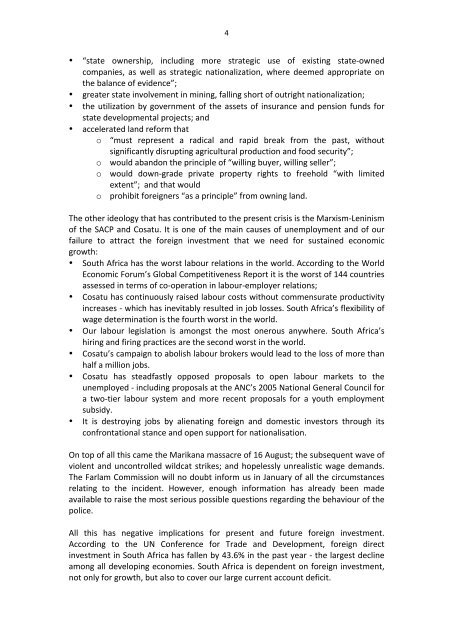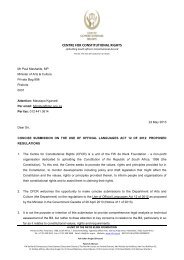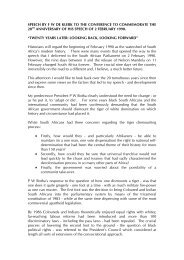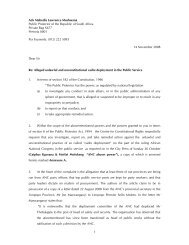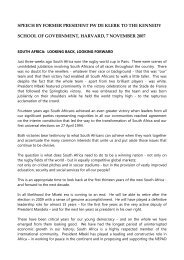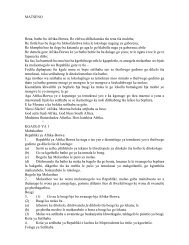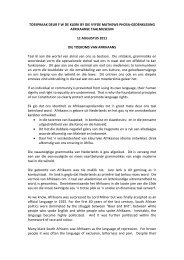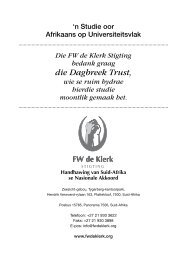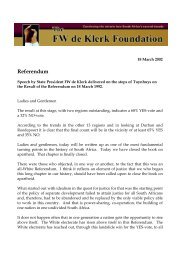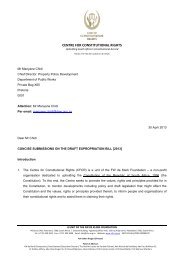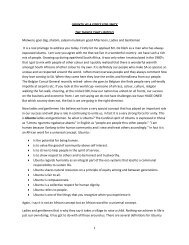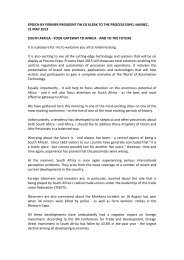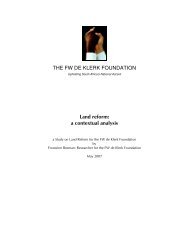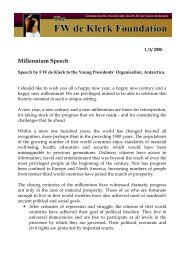speech - FW de Klerk Foundation
speech - FW de Klerk Foundation
speech - FW de Klerk Foundation
Create successful ePaper yourself
Turn your PDF publications into a flip-book with our unique Google optimized e-Paper software.
4<br />
• “state ownership, including more strategic use of existing state-‐owned<br />
companies, as well as strategic nationalization, where <strong>de</strong>emed appropriate on<br />
the balance of evi<strong>de</strong>nce”;<br />
• greater state involvement in mining, falling short of outright nationalization;<br />
• the utilization by government of the assets of insurance and pension funds for<br />
state <strong>de</strong>velopmental projects; and<br />
• accelerated land reform that<br />
o “must represent a radical and rapid break from the past, without<br />
significantly disrupting agricultural production and food security”;<br />
o would abandon the principle of “willing buyer, willing seller”;<br />
o would down-‐gra<strong>de</strong> private property rights to freehold “with limited<br />
extent”; and that would<br />
o prohibit foreigners “as a principle” from owning land.<br />
The other i<strong>de</strong>ology that has contributed to the present crisis is the Marxism-‐Leninism<br />
of the SACP and Cosatu. It is one of the main causes of unemployment and of our<br />
failure to attract the foreign investment that we need for sustained economic<br />
growth:<br />
• South Africa has the worst labour relations in the world. According to the World<br />
Economic Forum’s Global Competitiveness Report it is the worst of 144 countries<br />
assessed in terms of co-‐operation in labour-‐employer relations;<br />
• Cosatu has continuously raised labour costs without commensurate productivity<br />
increases -‐ which has inevitably resulted in job losses. South Africa’s flexibility of<br />
wage <strong>de</strong>termination is the fourth worst in the world.<br />
• Our labour legislation is amongst the most onerous anywhere. South Africa’s<br />
hiring and firing practices are the second worst in the world.<br />
• Cosatu’s campaign to abolish labour brokers would lead to the loss of more than<br />
half a million jobs.<br />
• Cosatu has steadfastly opposed proposals to open labour markets to the<br />
unemployed -‐ including proposals at the ANC’s 2005 National General Council for<br />
a two-‐tier labour system and more recent proposals for a youth employment<br />
subsidy.<br />
• It is <strong>de</strong>stroying jobs by alienating foreign and domestic investors through its<br />
confrontational stance and open support for nationalisation.<br />
On top of all this came the Marikana massacre of 16 August; the subsequent wave of<br />
violent and uncontrolled wildcat strikes; and hopelessly unrealistic wage <strong>de</strong>mands.<br />
The Farlam Commission will no doubt inform us in January of all the circumstances<br />
relating to the inci<strong>de</strong>nt. However, enough information has already been ma<strong>de</strong><br />
available to raise the most serious possible questions regarding the behaviour of the<br />
police.<br />
All this has negative implications for present and future foreign investment.<br />
According to the UN Conference for Tra<strong>de</strong> and Development, foreign direct<br />
investment in South Africa has fallen by 43.6% in the past year -‐ the largest <strong>de</strong>cline<br />
among all <strong>de</strong>veloping economies. South Africa is <strong>de</strong>pen<strong>de</strong>nt on foreign investment,<br />
not only for growth, but also to cover our large current account <strong>de</strong>ficit.


